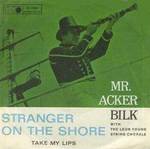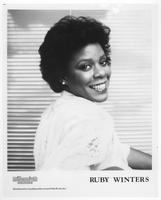Related Research Articles

"Stranger on the Shore" is a piece for clarinet written by Acker Bilk for his young daughter and originally named "Jenny" after her. The tune was written on a single scrap of paper by Bilk and handed over to arranger Leon Young who crafted the string arrangement, including the characteristic harmonic shifts at the very end.

Charles Anthony Graci, known professionally as Charlie Gracie, was an American rock and roll and rhythm and blues singer and guitarist. His biggest hits were "Butterfly" and "Fabulous", both in 1957.
"I Believe" is a popular song written by Ervin Drake, Irvin Abraham, Jack Mendelsohn and Al Stillman in 1953. The most popular version was recorded by Italian-American singer Frankie Laine, and spent eighteen weeks at No. 1 on the UK Singles Chart.
"Don't Let the Stars Get in Your Eyes" is a country song about a man away from home who is worried that his paramour may unwittingly stray from their relationship. It was written by Winston L. Moore and published in 1952. The song has been recorded in many different styles by many performers, with Perry Como's version hitting number 1 in both the US and UK.
"The Song from Moulin Rouge", sub-titled "Where Is Your Heart", is a popular song that first appeared in the 1952 film Moulin Rouge. It became a No. 1 hit in the UK Singles Chart when recorded by Mantovani. The music for the film was written by Georges Auric; the original French lyrics were by Jacques Larue, with the English words by William Engvick. The Auric-Engvick song was published in 1953.

"Beyond The Sea" is the English-language version of the French song "La Mer" by Charles Trenet, popularized by Bobby Darin in 1959. While the French original was an ode to the sea, Jack Lawrence – who composed the English lyrics – turned it into a love song.
"Suddenly There's a Valley" is a popular song written by Chuck Meyer and Biff Jones and published in 1955.
"I'm Gonna Sit Right Down and Write Myself a Letter" is a 1935 popular song with music by Fred E. Ahlert and lyrics by Joe Young. It has been recorded many times, and has become a standard of the Great American Songbook. It was popularized by Fats Waller, who recorded it in 1935 at the height of his fame.
"Dedicated To The One I Love" is a song written by Lowman Pauling and Ralph Bass that was a hit for the "5" Royales, the Shirelles, the Mamas & the Papas and Bitty McLean. Pauling was the guitarist of the "5" Royales, the group that recorded the original version of the song, produced by Bass, in 1957. Their version was re-released in 1961 and charted at number 81 on the Billboard Hot 100.
"You're Nobody till Somebody Loves You" is a popular song written by Russ Morgan, Larry Stock, and James Cavanaugh and published in 1944. The song was first recorded by Morgan and was a hit for him in 1946, reaching the No. 14 spot in the charts. The best known version was Dean Martin's, which was released in 1960 and reissued in 1964.

The Blossoms were an American girl group that originated from California. During their height of success in the 1960s, the group's lineup consisted of Darlene Love, Fanita James, and Jean King.

Ruby Winters was an American soul singer: primarily recording in Nashville, Winters had several R&B hits from 1967 to 1974 but is best known for her 1977 UK Top Ten hit "I Will".
"Morgen" is a popular song (1959), originally performed in German by Croatian singer Ivo Robić and The Song-Masters, accompanied by Bert Kaempfert and his orchestra.

"Do You Know What I Mean" is a song written and performed by Lee Michaels. It was produced by Michaels.

"98.6" is a song written by Tony Powers (lyrics) and George Fischoff (music) and recorded by Keith. It reached No. 6 in Canada, No. 7 on the Billboard chart, and No. 24 on the UK Singles Chart in 1967 and appeared on his 1967 album 98.6/Ain't Gonna Lie. The Tokens, who had provided the backing vocals on Keith's debut single, "Ain't Gonna Lie", did the same for "98.6".
"Fabulous" is a song first performed by Charlie Gracie in 1957. It is his second and last appearance on the Billboard Top 40 besides the chart-topping "Butterfly". It made it to number 16 on US Billboard chart. The song was popular in the United Kingdom and internationally reaching number 6 on the UK Singles Chart and number 6 in Canada.
"Everybody" is a song written and performed by Tommy Roe. The song reached #3 on the Billboard Hot 100 and #9 on the UK Singles Chart in 1963. The song appeared on his 1966 album, Sweet Pea.
"Cherry Pie" is a song written by Joe Josea and originally performed by Marvin & Johnny in 1954 as the B-side to their single "Tick Tock".

"Chick-A-Boom " is a song written by Janice Lee Gwin and Linda Martin and performed by Daddy Dewdrop. It was featured on his 1971 album, Daddy Dewdrop. The lyrics in the verses are spoken, rather than sung.
"With These Hands" is a song written by Benny Davis and Abner Silver and performed by Eddie Fisher featuring Hugo Winterhalter and His Orchestra. It reached number 7 on the U.S. pop chart in 1953.
References
- ↑ Rice, Jo (1982). The Guinness Book of 500 Number One Hits (1st ed.). Enfield, Middlesex: Guinness Superlatives Ltd. pp. 31–2. ISBN 0-85112-250-7.
- ↑ "Butterfly (song by Charlie Gracie) • Music VF, US & UK hits charts". Musicvf.com. Retrieved 2014-04-03.
- ↑ Roberts, David (2006). British Hit Singles & Albums (19th ed.). London: Guinness World Records Limited. p. 72. ISBN 1-904994-10-5.
- ↑ "Butterfly (song by Andy Williams) • Music VF, US & UK hits charts". Musicvf.com. Retrieved 2014-04-03.
- ↑ "CHUM Hit Parade - May 27, 1957".
- ↑ "45cat.com". 45cat.com. Retrieved February 19, 2018.
- ↑ Tobler, John (1992). NME Rock 'N' Roll Years (1st ed.). London: Reed International Books Ltd. p. 42. CN 5585.
- ↑ "Discogs.com". Discogs.com. 1960. Retrieved February 19, 2018.
- ↑ "Discogs.com". Discogs.com. Retrieved February 19, 2018.
- ↑ "Darlene Gillespie – Darlene Of The Teens And Friends (2001, CD)". Discogs.com. Retrieved 27 April 2021.